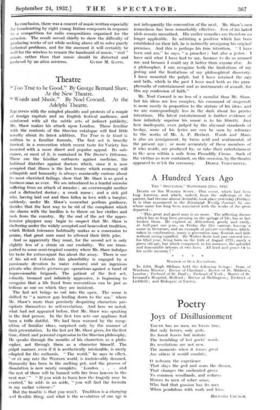Theatre
"Too True to be Good:" By George Bernard Shaw.
- At the New Theatre.
" Words and Music." By Noel Coward. At the Adelphi Theatre. • EQUIPPED with the mingled plaudits and protests of a couple of foreign capitals and an English festival audience, and reinforced with all the subtle arts of indirect publicity, Mr. Shaw • makes his attack upon London. Those familiar with the contents of the Shavian catalogue will find little novelty about its latest addition. Too True to be Good is written to a familiar formula. The first act is broadly farcical, in a convention which recent taste for Variety has invested with a more direct and popular appeal. Its sub- stance, or most of it, is contained in The Doctor's Dilemma. There are the familiar outbursts against medicine, the habitual diatribes against doctors -which, since it is now accepted that illness is the last luxury which economy will relinquish and humanity is always maniacally curious about its most cherished failings, show that Mr. Shaw is as good a businesS man as ever. We are introduced to a tearful microbe suffering from an attack of measles ; an overwrought mother and a distracted doctor ; a crook nurse ; and. a sick girl who, having laid out and then fallen in love with a burglar, suddenly, under Mr. Shaw's somewhat perilous guidance, decides that the best way to be rid of the complaint which she shares with the bacillus is to throw on her clothes and rush from the country. By the end of the act the appre- hensive playgoer may begin to suspect that Mr. Shaw is sheltering under the widely accepted and benevolent tradition, Is hick British. tolerance habitually makes as a concession to genius, that great men must be allowed their little joke.
And so apparently they must, for the second act is only slightly less of a strain on our credulity. We are trans- ported to some semi-tropical country where Mr. Shaw indulges his taste for extravagant fun about the army. There is one of his nit-wit Colonels (his plausibility is engaged by a passionate devotion to water colours) and an ingenious private who directs picturesiue operations against a band of impressionable brigands. The patient of the first act, robustly bronzed and infinitely aggressive, is beginning to recognize that :a life freed from conventions can be just as tedious as one on which they are insistent.
The last net brings us out into the open. The scene is shifted to " a narrow gap leading down to the sea," where Mr. Shaw's more than poreinely despairing characters pre- cipitate themselves to self-revelation. And here we noted, What had not appeared before, that Mr. Shaw was speaking in the first person. In the first two acts our applause had been a trifle dutiful. We had been warmed by the recog- nition of familiar ideas, surprised. only by the manner of their presentation. In the last act i% r. Shaw gives, for the first time, direct and personal expression to the Shavian philosophy. He speaks through the mouths of his characters as a philo- s4her, not through them as a character himself. The pulpit manner, even if it is aesthetically intolerable, is nicely adapted for the catharsis. " The world," he says in effect, or at any rate the Western world, is irretrievably damned. Humanity has been in the melting pot, and the process of dissolution is now nearly complete. London . . . and the rest of them will be burned With fire from heaven in the next war.' " If you wish to learn how the tragedy may be averted," he adds in an aside, " you will find the formula in my earlier volumes."
But the trouble is that you won't. Tradition is a changing and flexible thing, and what is the revolution of one age is not infrequently the convention of the next. Mr. Shaw's own iconoclasm has been remarkably effective. Few of his hated idols remain unscathed. His earlier remedies are therefore no longer applicable. In satirizing a position which has been established on their fall, he is indirectly arraigning his original premises. And this is perhaps his true intention. " I have been and am," he says, " a preacher ; but also a jester. I have said what I have had to say, because to do so amused me, and because I could say it better than anyone else. As a philosopher, I can recognize both the limitations of my jesting and the limitations of my philosophical discovery. I have mounted the pulpit, but I have retained the cap and bells, which in the past I have used both as the para- phernalia of entertainment and as instruments of assault, for this my confeSsion of faith."
Mr. Noel Coward is no less of a moralist than Mr. Shaw, but his ideas are less complex, his command of stagecraft is more nearly in proportion to the stature of his ideas, and we are correspondingly less in the dark about his precise intentions. His latest entertainment is further evidence of how infinitely superior his music is to his libretti. Just how inadequate, even judged by the abysmal standards of to-day, some of his lyrics are can be seen by reference to the works of Mr. A. P. Herbert. Words and Music is also an arraignment, by turns acid and sentimental, of the present age ; or more accurately of those niembers of it who reside, are produced by, or take their entertainment in the area within a mile from Piccadilly Circus. Such of the victims as were contained, on this occasion, by the theatre
appeared to Wish the ceremony. DEREK VERSCHOYI.E.






























 Previous page
Previous page